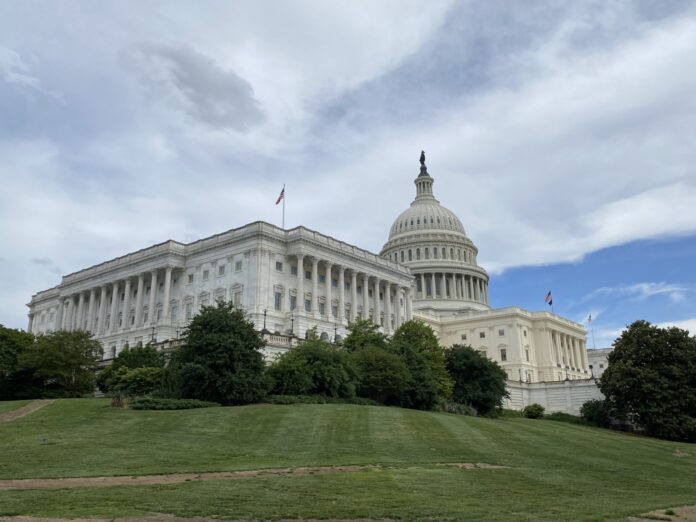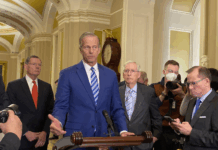
WASHINGTON (States Newsroom) — Republicans cannot exempt gun silencers, short-barreled rifles and short-barreled shotguns from being classified as firearms under a federal gun regulation law from the 1930s, according to the Senate parliamentarian’s latest ruling on the “big, beautiful bill.”
The provision addressing silencers, also called suppressors, was added to the House’s version of the bill by Georgia Rep. Andrew Clyde. The Senate Finance Committee expanded it, adding in the other two classifications.
Also out of the bill is a sweeping private school voucher program that would have extended billions a year in tax credits to parents who move their children out of public schools.
The rulings mean those sections now will be dropped from the Senate version of the tax and spending cut measure, or rewritten in a way that meets the rules.
Friday morning’s disclosure of the latest parliamentary ruling came as the Senate continues to struggle with the massive legislation, which GOP leaders in Congress want to pass in time for a self-imposed Fourth of July deadline for President Donald Trump’s signature.
The Senate will likely stay in session throughout the weekend and possibly into early next week to finish negotiations on provisions and release the final text, take a procedural vote, debate the bill, hold a marathon amendment voting session and then vote on final passage.
The House, which is scheduled to be in recess all next week for the holiday, is expected to return to Capitol Hill about two days after the Senate approves the bill to clear the legislation for Trump’s signature.
Gun silencer debate in House
Clyde said during floor debate in May that because silencers were included in the National Firearms Act, they were also subject to a $200 tax that he argued violates people’s Second Amendment rights.
“Under the law, they are firearms and therefore are protected by another law enacted in 1791 called the Second Amendment of our beloved Constitution,” Clyde said. “The right of the people to keep and bear arms shall not be infringed, and neither shall it be taxed.”
Florida Democratic Rep. Maxwell Frost spoke out against the House provision during floor debate, saying that during mass shootings, “silencers make it harder to identify and respond to the source of the gunshots.
“Earlier, I put forth an amendment to strip this tax cut for the gun lobby, and House Republicans wouldn’t even let it come up for a vote.”
Frost said that during 2023, the Bureau of Alcohol, Tobacco, Firearms and Explosives “recovered over 400 silencers from violent crime scenes. For this reason, silencers have been highly regulated for nearly 100 years.”
Senate Finance Committee ranking member Ron Wyden, D-Ore., released a statement Friday following the parliamentarian’s ruling, saying it eliminated Republicans’ “scheme to eliminate background checks, registrations and other safety measures that apply to easily-concealed firearms and gun silencers.”
“It’s no surprise that Republicans will jump at any opportunity to please the gun lobby by rolling back gun safety measures, but that kind of policy does not belong in a reconciliation bill,” Wyden wrote.
Finance Committee Chairman Mike Crapo, R-Idaho, did not immediately respond to a request for comment. But the committee has been going back and forth with the parliamentarian on how to rework other provisions deemed noncompliant to get them into the final bill.
A summary of the provision from Crapo’s office says it would have resulted “in the elimination of the transfer and manufacturing tax on these devices” and preempted “certain state or local licensing or registration requirements which are determined by reference to the National Firearms Act by treating anyone who acquires or possesses these rifles, shotguns, or other weapons in compliance with federal statute to be in compliance with the state or local registration or licensing requirements.”
Private school vouchers scrapped
The parliamentarian struck down the private school voucher program tucked into the Senate Finance Committee’s portion of the package, marking a significant blow to Trump’s and congressional Republicans’ school choice push.
The umbrella term “school choice” centers on alternative programs to a student’s assigned public school. Though advocates say school choice programs are necessary for parents dissatisfied with their local public schools, critics argue these efforts drain critical funds and resources from school districts.
The committee proposed $4 billion a year in tax credits beginning in 2027 for people donating to organizations that provide private and religious school scholarships.
The tax credit provision mirrored a bill that GOP lawmakers — Sen. Bill Cassidy of Louisiana along with Reps. Adrian Smith of Nebraska and Burgess Owens of Utah — reintroduced in their respective chambers earlier this year.
Immigration
Several provisions to reshape how immigrants apply for asylum were struck down by the parliamentarian Friday.
Those provisions would have required a $1,000 fee for an immigrant to apply for asylum – something that is currently free to people fleeing harm or persecution – and imposed a $5,000 fee for someone to sponsor an unaccompanied minor.
Some of the provisions would have added extra fees to immigration courts, which are already facing a historic backlog of millions of cases, for a mandatory $100 fee to continue a case.
The parliamentarian also struck out a policy that would have extended quick deportations, known as expedited removal, to immigrants arrested for a crime regardless of legal status.
Expedited removal is a deportation tool used to swiftly remove an immigrant near a U.S. border without appearing before an immigration judge. The Trump administration has already expanded its use of expedited removal to include the interior of the U.S., rather than just at borders such as Mexico and Canada.
State and local tax
Senate Republicans were still wrangling Friday afternoon over the amount of state and local taxes, or SALT, that taxpayers can deduct from their federal tax bills. House Republicans who represent high-tax blue states are pressuring their counterparts in the Senate to agree on a $40,000 deduction cap for taxpayers who earn up to $500,000 annually.
Treasury Secretary Scott Bessent briefly stepped out of closed-door negotiations to brief reporters, telling them a deal was “very, very close.”
The handful of House Republicans who represent blue states, including New York and California, carry a lot of leverage over final passage of the bill because of the party’s razor-thin margin in the House.
Reconciliation process
Republicans are moving their sweeping tax and spending cuts bill through Congress using a special process called budget reconciliation that comes with complex rules in the Senate.
The chamber’s parliamentarian combs through the bill, hears from Republicans and from Democrats before determining whether each provision has an impact on spending, revenue, or the debt limit.
There are several other aspects to the Byrd rule, named for former West Virginia Sen. Robert Byrd, including that a provision cannot have a “merely incidental” impact on the federal ledger. Reconciliation bills also cannot touch Social Security.
The parliamentarian has ruled several other provisions in the GOP mega-bill don’t comply with the guardrails for a reconciliation bill, though some committees have been able to rework certain policy changes to fit.
Republicans chose to move the bill through reconciliation because it allows them to get around the Senate’s 60-vote legislative filibuster, which typically forces bipartisan negotiations on major legislation.
The process is time-consuming and opaque, but Republican leaders in Congress are still pushing forward with their self-imposed Fourth of July goal.
Shauneen Miranda contributed to this report






